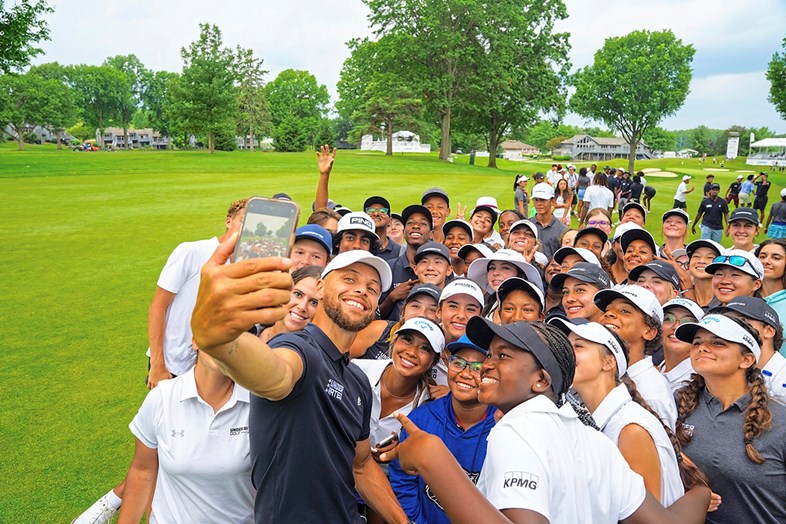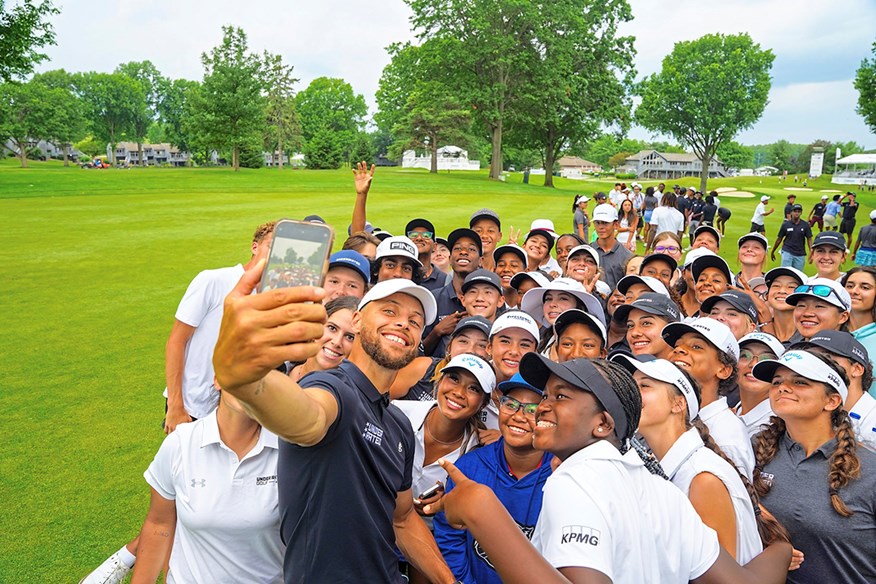
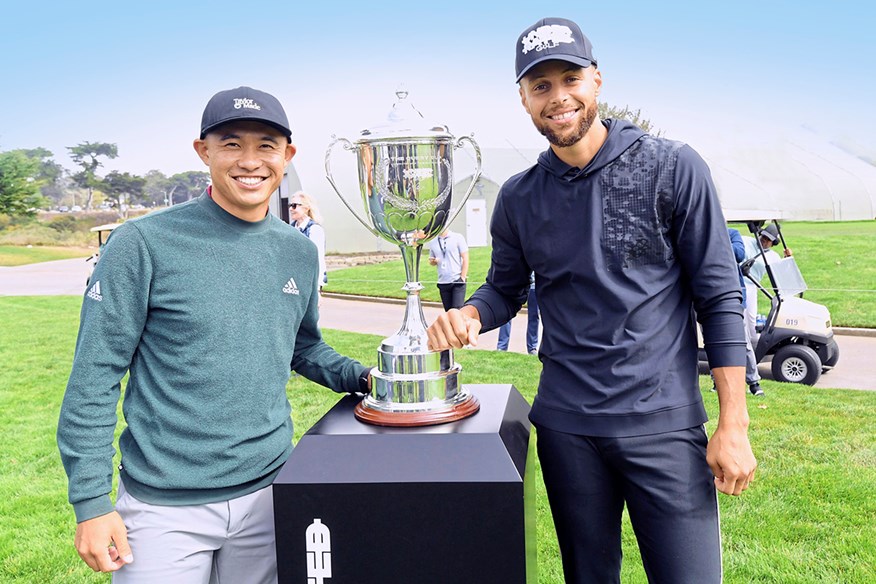
Steph Curry is genuinely helping to grow the game. Take note, LIV golfers.
From NBA’s greatest shooter to golf’s unexpected leader, Steph Curry is levelling the playing field with the Underrated Golf Tour.
The crowds at Liberty National are a little smaller than the ones Steph Curry usually draws. There are no TV cameras craning overhead, no playoff pressure, no roar of thousands of fans erupting
at a buzzer-beater. Instead, on a Friday afternoon in New Jersey, one of the greatest NBA stars of his generation is standing alongside parents, staff, and coaches, supporting the 31 boys and girls that are competing in the two-day tournament that bears his name.
Steph Curry is walking the course not as a celebrity guest but as the host and driving force behind the Curry Cup, the final leg of what is fast becoming one of the most impactful junior golf initiatives. Fewer than two percent of all golfers are of black or Latino heritage, according to his own website, which is why he has made it his mission to bring participation amongst these communities up to 26 percent to better reflect today’s society. He’s made a pretty good go of it so far.
In just four seasons, more than 400 players have come through his Underrated Golf Tour, which works to provide equity, access, and opportunity to talented high school athletes from all communities.
“This all started with my love for golf, the community and all the opportunities and experiences that it creates,” he says, smiling. “I started playing casually when I was 10, kind of as a change of speed to basketball, but it was always a passion of mine. As I got into a league and started to understand how big the world of golf was, that’s when it highlighted some of the boundaries that exist around the game of golf.
“There are all these amazing programs all around the world that are trying to [remove those boundaries], but for me I wanted to hone in on that competitive age group, between the ages of 12 to 18, to create scholarship opportunities for these kids to pursue golf at the next level, but also give them the tools and the skills to be successful in anything that they choose to do.”
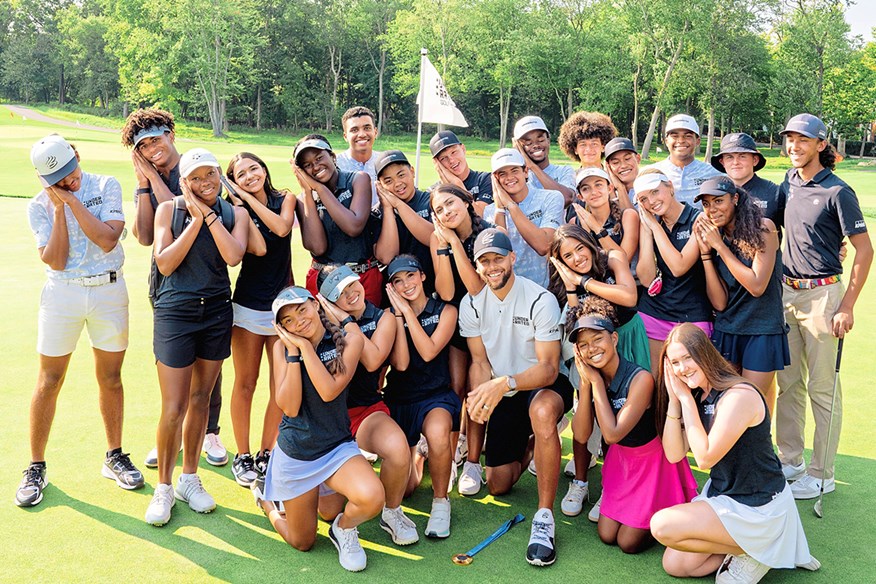
The 37-year-old American is not about to pretend that he encountered the same barriers to entry as the kids he is now cheering for, but his path into basketball was not without its challenges. All the way through high school, Curry had to fight to be noticed. He was told he was too small, too slight to succeed in a sport full of giants. He proved his doubters wrong by going on to become the NBA’s all-time three-point scorer, but he never forgot the tags that followed him early in his career. Launching the Underrated brand was his way to rewrite the script.
“When I got started on this journey, it was about turning Underrated into a badge of honour. I was a late bloomer coming in to basketball. I was under-recruited, just looking for an opportunity, so when we started the Underrated Basketball Tour, we were kind of looking for the next me while creating opportunities for those kids that were underrated and undervalued. And once there was some momentum behind that name, we took it to golf.”
So much of Curry’s work away from the court has centred on giving back in a big way. In 2019, he guaranteed six years of full funding to Howard University’s men’s and women’s golf programs, reviving a team at a historically black institution that hadn’t fielded one since the 1970s. It was the kind of gesture golf rarely sees from outside its own bubble, but it didn’t stop there.
Three years later, Curry launched the Underrated Golf Tour and made a seven-figure commitment out of his own pocket so kids could be recruited based on talent and potential, not income. Families now arrive at events knowing their expenses are fully paid for.
“It’s been an amazing journey so far, just supporting these kids and their families, [and] giving them a first-class experience,” he says. “It’s something I want to do for a very long time, planting our flag and creating a meaningful and sustainable impact. It’s been great, while my star is probably at the brightest that it will ever be, to create awareness around what we’re doing within the world of golf. I play a lot of golf, so it is very authentic to how I spend my time, and how I get joy in life outside of basketball.”
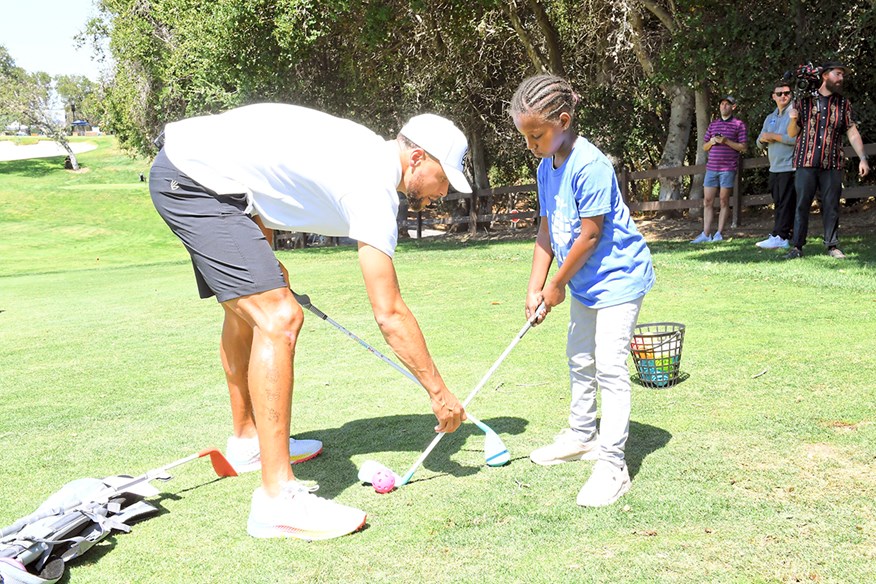
To truly grasp the importance of what Curry is building, you have to understand the landscape of junior golf. According to Will Lowry, who serves as the Underrated Tour’s ambassador, competing seriously on an elite junior circuit can cost families as much as $25,000 per year once travel, entry fees, private coaching, memberships and equipment are factored in.
For many parents, especially in underrepresented communities, that financial burden is too much to take on. That’s why the faces at these tournaments often look the same. Mostly white, mostly affluent, mostly suburban. Curry saw this disparity first-hand.
“I grew up in Charlotte, and whenever I walked out there on the course and looked up and down the range, there weren’t many black and brown kids out there,” he says. “When I was in high school, you knew it was an expensive sport, you knew it was very exclusive, and if you didn’t have access to a country club or a good public golf course, it would feel intimidating to get in and understand how to navigate the golf world. That, for me, was a good experience to call back on once we started to develop our tour.”

In 2024, the Underrated Golf Tour expanded to Europe for the first time. This year there were stops at Foxhills in Surrey, and Fairmont St Andrews in Scotland, in addition to the four events in Colorado, Indiana, California and Florida, plus the Curry Cup in New Jersey.
Tomorrow, Mariah Stackhouse – the only black full-time member of the LPGA Tour – will host a KPMG Leadership day where its members will participate in interactive workshops and connect with college recruiters and leaders from the world of business, sports and entertainment. For Curry, it’s yet another way of giving talented student-athletes the platform and support needed to develop and find new opportunities inside and outside of golf.
“Everything that we do with each one of our tour stops kind of checks all these boxes,” explains Curry. “We want a first-class golf course, but we also want to give them the greatest experience with the Curry brand, Callaway and all of our partners. We want to bring in guest speakers to talk about the world that is broader than golf, and then we want the kids to travel, to see the world in a different light.”
What makes Curry’s new role as a Global Golf Development Ambassador for The R&A so unique is that he isn’t parachuting in from another sport without credibility or connections. Sure, he talks a very good game, but he plays an even better one as a scratch-level golfer – officially a +2 handicap – with
“a tremendous, natural ability” according to Butch Harmon.
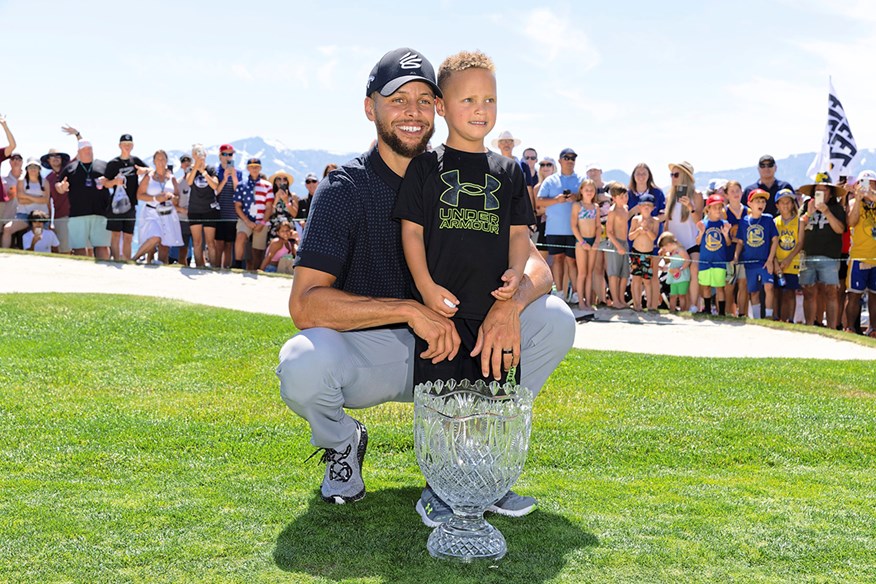
He famously held his own on the Korn Ferry Tour in 2017 and 2018, breaking 75 three times in four rounds at the Ellie Mae Classic. “I didn’t finish last,” he says, laughing. “I did beat some of the pros out there. I don’t get a trophy or a plaque for that, but it’s a great story to tell.”
There are other stories he can tell, like the time the PGA Tour presented him with the Ambassador of Golf Award in 2023, or the Charlie Sifford Award in 2024, in recognition of his dedication to advancing diversity in golf. Curry is keen to point out, though, that this is not a vanity side hustle.
Friends on tour, such as Jordan Spieth, Justin Thomas and Collin Morikawa, can vouch for his love of the game. They’ve lent support, sometimes showing up to Curry’s events and giving talks. He’s even managed to bring Henni Zuel and Gareth Bale on board as Underrated Golf ambassadors to help recruit golfers from diverse backgrounds and communities.
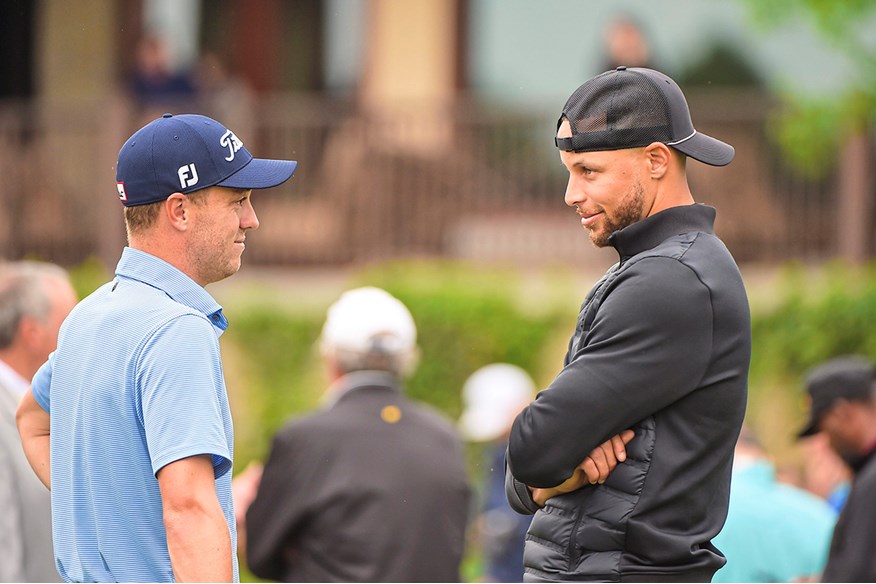
“Everything we’ve done has exceeded my expectations, in a good way,” says Curry, who is a four-time NBA champion with the Golden State Warriors. “Being able to go to Europe, to plant our flag there and create a little bit more reach is really cool. We want to create that competitive environment that builds to a crescendo moment at the end of the tour. But no matter if they make the Curry Cup or not, we want every kid to go away a better person and a better golfer based on the experiences they’ve had on the tour. We want them to talk about it as they go back into their community.”
What started as a passion project has quickly become a proving ground for players golf usually forgets. College scouts now circle his events on their calendars each year, and more and more sponsors are starting to take notice. Many alumni have gone on to earn golf scholarships already, which leads me to suggest that it’s surely only a matter of time before someone graduates to the PGA or LPGA Tour. The thought has crossed Curry’s mind, too.
“That would be an unbelievable moment,” he says, excitedly. “But in the meantime, we want to continue to do what we do well, create that validation, and really hone in on scaling this, not only in the States, but internationally as well. I think that’ll define true success for us.
“But whether it’s 10 or 20 years down the road, I’m going to be all in on it, full commitment, even to the point where I could be a little more available on site for each of these tournaments once basketball is over. Golf is a passion, but this is kind of where passion and purpose meet for me, so it is very special.”
For now though, Curry has little interest in leaving Liberty National early. He’s the one lingering and making sure no kid leaves without a word of encouragement, autograph or fist bump. These small acts are telling ones when so much of golf’s rhetoric nowadays is about growing the game. And if golf is serious about its future, it would do well to look less at its money-spinning tours and more at the NBA star who is giving underrepresented kids exposure to courses, conditions and college coaches that have historically been out of reach. Curry clearly doesn’t need golf to define his legacy, but golf certainly needs people like him to help redefine its future.
About the author


